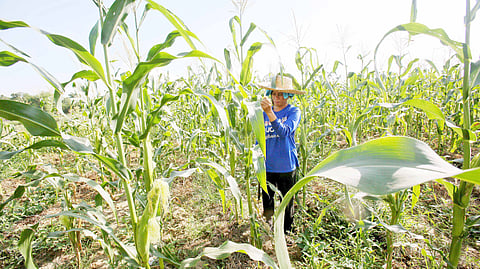
- NEWS
- the EDIT
- COMMENTARY
- BUSINESS
- LIFE
- SHOW
- ACTION
- GLOBAL GOALS
- SNAPS
- DYARYO TIRADA
- MORE

Senator Francis "Kiko" Pangilinan is doubling down on efforts to shield Filipino farmers from abusive trading practices and climate-induced losses, pushing both for a clear mechanism to define rice profiteering and for stronger crop insurance support.
During the second public hearing of the Committee on Agriculture, Food, and Agrarian Reform jointly with the Committees on Finance and Ways and Means on Wednesday, 27 August, Pangilinan pressed for a proper definition of rice profiteering to effectively go after erring traders and hoarders.
"In other words, if we want to protect or give our beneficiaries a fighting chance, how can we determine that? What exactly is profiteering in that matter?" he asked.
The senator raised the issue amid reports that traders have been low-balling rice farmers by buying palay at P5 to P10 per kilo despite production costs ranging from P14 to P17 per kilo. These are then sold in the market for P40 to P45 per kilo.
"We are complaining that it is too cheap, P5 a kilo is a loss. Why P5? Because it makes a lot of money, etc. Well, it's all speculative. There is no science in determining how much you really earn when you buy it for P5 a kilo," Pangilinan lamented.
He explained that a mechanism to define profiteering, included in proposed amendments to the Rice Tariffication Law (RTL), would help protect farmers and their livelihoods. One of his first moves upon returning to the Senate was to file a resolution seeking an investigation into the RTL, which he said has failed to achieve its goals of lowering rice prices and uplifting farmers’ lives.
A day later, Pangilinan also advocated for increased crop insurance coverage for farmers, stressing the urgent need to safeguard rural livelihoods against typhoons, droughts, and pest infestations.
In a media interview on Thursday, 28 August, Pangilinan lamented that the current budget for the Philippine Crop Insurance Corporation (PCIC) cannot cover all 11 million farmers in the country, as coverage currently only reaches about eight million.
"We will give them extra support, ensure their vegetables so that if there is frost and damage to the crops due to a calamity or a typhoon, they could act quickly and restore even half of it," he said.
"At least cover half of what was spent so they could recover and replant," he added.
Pangilinan vowed to push for higher funding in the next three years. "Crop insurance is very important. We must really fight for it in the next three years. If not 50 percent, let's increase our insurance funding by 100 percent," he said.
Data from the Department of Agriculture showed that agricultural losses in 2024 due to El Niño, pests and diseases, volcanic activities, and tropical cyclones amounted to P57 billion. The combined effects of tropical storms Crising, Dante, and Emong along with the southwest monsoon (habagat) brought another P1.12 billion in damages in July.
On Thursday, the PCIC distributed P1.95 million in insurance payments to beneficiaries in Benguet, where Pangilinan, who chairs the Senate Committee on Agriculture, Food, and Agrarian Reform, personally attended.
The senator noted that other countries also provide health and accident insurance for farmers, and assured that he would continue fighting for stronger protection for Filipino farmers and fisherfolk.
